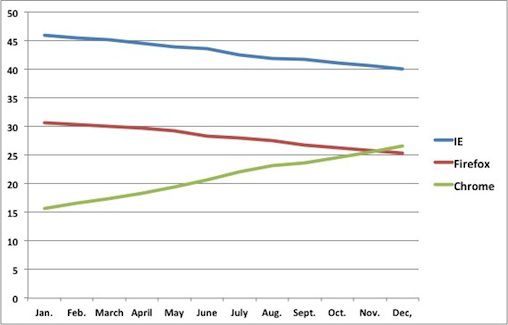 Just over a month ago we reported that by the end of 2011, Chrome may have overtaken Firefox to become the second most used web browser. Well, according to new data from StatCounter this has now happened!
Just over a month ago we reported that by the end of 2011, Chrome may have overtaken Firefox to become the second most used web browser. Well, according to new data from StatCounter this has now happened!
Google Chrome now has a 25.69% worldwide market share. This compares to Mozilla Firefox with a 25.23% share. Microsoft’s Internet Explorer is still in the lead however with a 40.63 percent share of the browser market.
Ok, so the difference between Chrome and Firefox’s share is only 0.46%, but this milestone of Chrome overtaking Firefox is still very significant. That’s considering Chrome’s global market share has already gained an impressive 10.8 percent this year alone. This big leap in usage comes at the expense of Firefox, which lost 5.5 percent, and Internet Explorer loosing 6.3 percent share of the market in 2011.
According to StatCounter’s CEO:
“We can look forward to a fascinating battle between Microsoft and Google as the pace of growth of Chrome suggests that it will become a real rival to Internet Explorer globally. Our stats measure actual browser usage, not downloads, so while Chrome has been highly effective in ensuring downloads our stats show that people are actually using it to access the web also.”
– Aodham Cullen, CEO of StatCounter
Earlier this week, Microsoft released their 4th developer preview of Internet Explorer 10. IE10 is expected to be released to coincide with the launch of Windows 8 in the latter half of 2012.
But you can be sure that the folks over at Mozilla won’t take the news that Chrome has overtaken them lightly!
…so it certainly looks like the Browser War will hot up even more in 2012!
But you can be confident that our ongoing commitment to support our room booking system in the latest releases of all 5 major browsers will continue throughout 2012!
 If you’re a Firefox user, you may be interested to know that the folks at Mozilla have released another(!) major version of their popular browser, Firefox! Having only recently released
If you’re a Firefox user, you may be interested to know that the folks at Mozilla have released another(!) major version of their popular browser, Firefox! Having only recently released 